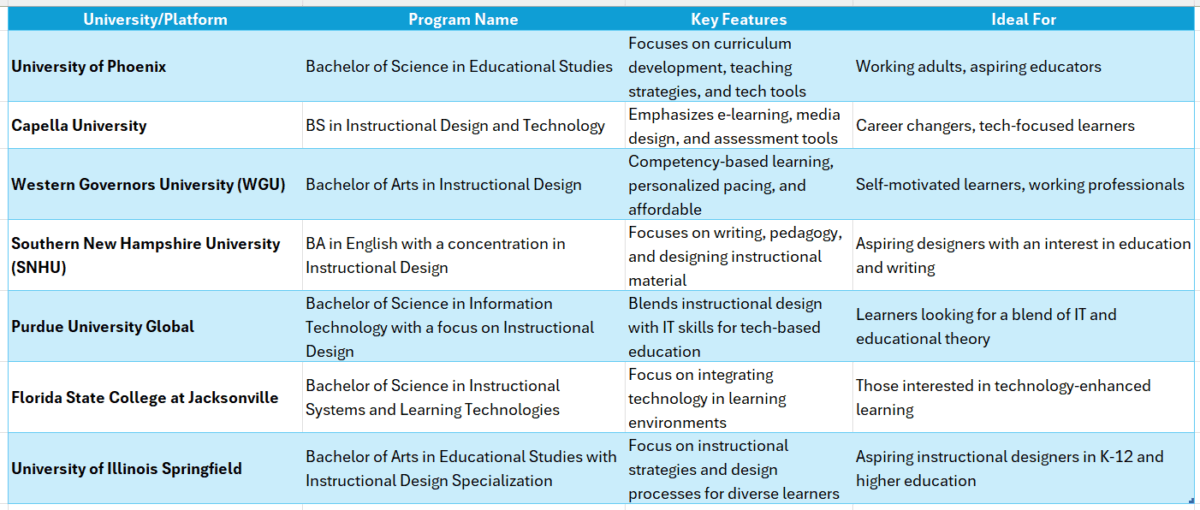
In today’s digital age, many students are curious about whether they can earn an instructional design bachelor’s online. This question is important because it opens doors to flexible learning options, allowing you to balance education with other commitments. Let’s dive into the benefits of pursuing this degree online!
Flexibility and Convenience
One of the biggest perks of an instructional design bachelor’s online is flexibility. You can study from anywhere, whether at home or on the go. This means you can fit your studies around your life, making it easier to manage work, family, and other responsibilities.
Comprehensive Instructional Design Curriculum
Another advantage is the comprehensive instructional design curriculum. Online programs often cover essential topics like learning theories, technology integration, and assessment strategies. This prepares you for a successful career in designing effective educational experiences. Plus, many programs offer pathways to a curriculum master’s degree, enhancing your expertise even further!
Networking Opportunities
Lastly, online programs often provide networking opportunities. You can connect with peers and professionals in the field through forums and group projects. This can lead to valuable relationships and job opportunities after graduation. Overall, an online instructional design bachelor’s degree is a smart choice for aspiring designers!
Start your journey to a brighter future—Enroll now!
What to Expect from an Online Instructional Design Program?

When considering a career in instructional design, many wonder, “Can you get an instructional design bachelor’s degree online?” This question is crucial because it opens doors to flexible learning opportunities. Online programs allow you to balance education with work or personal commitments, making it easier to pursue your passion for creating effective learning experiences.
In an instructional design bachelor’s online program, you can expect a comprehensive curriculum that covers essential topics. Here’s what you might study:
- Learning Theories: Understanding how people learn is key to designing effective educational materials.
- Technology Integration: You’ll learn how to use various tools and platforms to enhance learning.
- Assessment Strategies: Discover how to evaluate the effectiveness of your instructional materials. These courses prepare you for real-world challenges in the field. Plus, many programs offer hands-on projects, allowing you to apply what you learn immediately.
If you’re considering further education, an instructional design curriculum can also serve as a stepping stone to a curriculum master’s degree, expanding your expertise and career opportunities. Overall, an online instructional design program is not just about earning a degree; it’s about gaining skills that will help you create engaging and effective learning experiences for diverse audiences. So, if you’re ready to dive into this exciting field, an online degree could be your first step!
Is an Instructional Design Bachelor’s Degree Worth It?
When considering your future, you might ask, “Is an Instructional Design Bachelor’s Degree worth it?” This question is vital as online education becomes more popular. Understanding the value of an instructional design bachelor’s online can guide your career choices.
Benefits of an Instructional Design Bachelor’s Degree
An instructional design curriculum provides essential skills for creating effective learning experiences. Key benefits include:
- Flexibility: Study from anywhere, balancing work and life.
- Career Opportunities: Graduates can work in education, corporate training, and e-learning.
- Skill Development: Learn to analyze learning needs and design engaging content.
Is It Right for You?
If you love teaching and technology, an instructional design bachelor’s online could be a perfect fit. Many programs also offer pathways to a curriculum master’s degree, enhancing your expertise. This degree can lead to a rewarding career in education.
The Growing Demand for Instructional Designers
The need for skilled instructional designers is increasing. As organizations move to online training, having this degree can distinguish you from others in the field.
Real-World Applications
With an instructional design bachelor’s online, you can apply your skills in schools, businesses, and non-profits, making the degree valuable across various industries.
Networking Opportunities
Studying online still allows for networking. Many programs host virtual events and forums to connect with professionals and peers, broadening your career prospects.
How to Choose the Right Online Program for Instructional Design?
Choosing the right online program for an instructional design bachelor’s degree is essential in today’s digital learning landscape. Many students are eager to know if they can pursue this degree online, and the answer is a resounding yes! But how do you find the best fit for your needs?
Understand the Instructional Design Curriculum
Familiarize yourself with the instructional design curriculum before diving in. Look for programs that cover key topics like learning theories, assessment strategies, and technology integration. A comprehensive curriculum will equip you for real-world challenges in the field.
Consider Accreditation and Reputation
When selecting an online program, ensure it is accredited. Accredited programs meet high educational standards, guaranteeing quality education. Additionally, research the program’s reputation through alumni reviews to gain insights into its strengths and weaknesses.
Evaluate Flexibility and Support
Flexibility is crucial when choosing an instructional design bachelor’s online. Seek programs that offer asynchronous classes for self-paced learning. Also, consider available support services, such as academic advising and technical assistance, which can enhance your online experience.
Check for Networking Opportunities
Networking is vital in instructional design. Look for programs that facilitate connections with industry professionals through online forums, webinars, or virtual job fairs. Building these relationships can lead to internships and job opportunities after graduation.
Review the Curriculum Master’s Degree Options
If further education interests you, explore curriculum master’s degree options at the same institution. Some programs allow a smooth transition from a bachelor’s to a master’s degree, saving time and enhancing your career prospects.
Start your journey to a brighter future—Enroll now!
Career Opportunities with an Instructional Design Bachelor’s Online
Getting an instructional design bachelor’s online is a great opportunity for those passionate about creating effective learning experiences. As education evolves, the demand for skilled instructional designers continues to rise, making this degree an attractive choice for many students.
Diverse Job Roles
Graduates can explore various roles, such as:
- Instructional Designer: Craft engaging learning materials for schools and businesses.
- E-Learning Developer: Design captivating online courses.
- Training Specialist: Develop training programs for employees across industries.
These positions are vital in today’s digital landscape, where effective teaching methods are essential for success.
Further Education Options
Many graduates also pursue a curriculum master’s degree to enhance their expertise, leading to higher-level positions and increased earning potential. This advanced degree often covers specialized topics like assessment strategies and technology integration, preparing students for leadership roles in education.
Job Market Growth
The job market for instructional designers is rapidly expanding, with many companies investing in online learning, creating high demand for skilled professionals. This growth translates to more opportunities for graduates with an instructional design bachelor’s online.
Skills Development
Studying instructional design equips students with essential skills, including:
- Analytical Thinking: Understanding learner needs.
- Technical Proficiency: Using software tools effectively.
- Communication Skills: Collaborating with experts and stakeholders.
Flexibility and Convenience
Earning an instructional design bachelor’s online offers flexibility, allowing students to study at their own pace while balancing work and personal commitments. This convenience helps many pursue their educational goals without sacrificing other responsibilities.
Tips for Succeeding in an Online Instructional Design Degree
Getting an instructional design bachelor’s online is an exciting opportunity for those looking to shape the future of education. With the rise of digital learning, understanding how to create effective instructional materials is more important than ever. But how can you succeed in this online journey?
Stay Organized
- Create a Schedule: Set aside specific times each week for studying. This helps you stay on track with your instructional design curriculum.
- Use Tools: Consider apps or planners to keep your assignments and deadlines in check.
Engage with Peers
- Join Online Forums: Connect with classmates through discussion boards. Sharing ideas can enhance your learning experience.
- Form Study Groups: Collaborating with others can make complex topics easier to understand, especially when tackling curriculum master’s degree concepts.
Seek Help When Needed
- Utilize Resources: Don’t hesitate to reach out to instructors or use tutoring services. They can provide guidance on challenging subjects.
- Explore Additional Materials: Look for online resources or books that complement your studies. This can deepen your understanding of instructional design principles.
By following these tips, you can navigate your online instructional design bachelor’s degree with confidence. Remember, the goal is to learn and grow, so embrace the journey and make the most of your educational experience!
How DegreeOnline.Education Can Help You Find the Perfect Program
Pursuing an instructional design bachelor’s degree online is an excellent opportunity for those eager to combine creativity with technology. As online learning becomes more prevalent, many students are curious about the possibility of earning this degree from home. This option is vital for aspiring instructional designers aiming to influence the future of education.
At DegreeOnline.Education, we streamline your search for an instructional design bachelor’s online. Our platform provides a detailed guide to various programs, allowing you to compare different instructional design curriculum options and find schools that align with your goals.
Key Benefits of Using DegreeOnline.Education
- Wide Selection: Access numerous accredited programs that offer flexibility and quality education.
- Detailed Insights: Discover information on the instructional design curriculum, including courses and specializations.
- Expert Reviews: Read testimonials from current students and alumni to make informed choices. Finding the right program can be daunting, but DegreeOnline.Education simplifies the process. We offer user-friendly filters to help you narrow down options based on cost, duration, and location.
Steps to Get Started
- Visit DegreeOnline.Education: Begin your journey on our homepage.
- Use Filters: Apply filters to find suitable programs.
- Compare Options: Review various instructional design bachelor’s online programs side by side.
- Read Reviews: Gain insights from those who have experienced the programs firsthand.
With our resources, you can confidently select a program that fits your career aspirations. The right instructional design curriculum can pave the way for your success in this dynamic field!
Start your journey to a brighter future—Enroll now!
FAQs
1. What is an online bachelor’s degree in instructional design?
It’s a 100% online undergraduate program that teaches how to design, develop, and deliver effective learning experiences using instructional technologies and educational theory.
2. What can I do with a degree in instructional design?
Graduates can become instructional designers, eLearning developers, curriculum specialists, training coordinators, or work in corporate, K–12, or higher education settings.
3. How long does it take to complete the program?
Most online bachelor’s degrees take about 4 years of full-time study. Some programs offer accelerated options or accept transfer credits for faster completion.
4. Are online programs respected by employers?
Yes, as long as the program is from a regionally accredited institution, online degrees are widely accepted and respected by employers.
5. What courses are typically included in this degree?
Common courses include instructional design theory, learning technologies, multimedia development, curriculum planning, and assessment strategies.
6. Do I need teaching experience to enroll?
No prior teaching experience is required. These programs are designed for both new students and professionals looking to enter the field.





